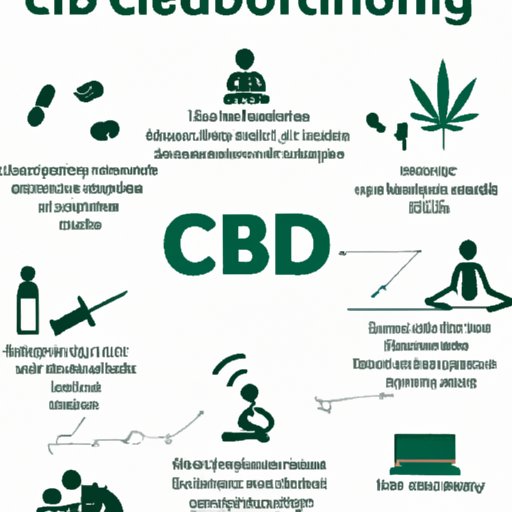I. Introduction
Over recent years, cannabidiol (CBD) has surged in popularity due to its alleged health benefits and reported absence of psychoactive effects. While many are turning to this non-intoxicating compound for relief from mental and physical ailments, others might wonder about the potential for addiction. In this article, we’ll explore the science, research, and personal experiences surrounding CBD addiction and examine the myths, misconceptions, and facts behind them.
A. Explanation of CBD and its use
CBD is a compound derived from cannabis plants that has been touted for its therapeutic properties, such as reducing anxiety, alleviating pain, improving sleep, and managing epilepsy. Unlike tetrahydrocannabinol (THC), the main psychoactive constituent of cannabis, CBD does not produce a “high” or impair cognitive function. It interacts with the body’s endocannabinoid system (ECS), a regulatory network of receptors and neurotransmitters that help maintain balance in bodily functions.
B. Overview of the conflicting information on CBD addiction
Despite the increasing popularity and availability of CBD products, there are mixed opinions regarding the potential for addiction. While some claim that CBD is non-addictive, others argue that it can lead to dependence and withdrawal symptoms, especially when used in high amounts or for prolonged periods.
II. The Science Behind CBD Addiction: Can You Really Get Hooked?
To understand whether CBD poses a risk for addiction, it’s essential to look at how the compound interacts with the brain and whether it shares similarities with addictive substances.
A. Explanation of how CBD interacts with the brain
When CBD enters the body, it interacts with the ECS’s CB1 and CB2 receptors, which are mainly found in the brain and the immune system. CBD does not bind to these receptors directly but works by modulating their activity, thereby influencing a wide range of physiological processes.
B. Comparison of CBD with other addictive substances
Studies have shown that addictive substances such as opioids, nicotine, and alcohol impact the brain’s reward system, leading to the release of dopamine, a neurotransmitter that mediates pleasure and motivation. However, unlike these substances, CBD does not have a direct effect on the reward system and does not cause a dopamine surge. Additionally, CBD has been found to counteract some of the effects of addictive substances, such as reducing drug-seeking behavior in rats and humans.
C. Discussion of the potential for CBD addiction
While CBD may not be addictive in the traditional sense, some researchers suggest that it can lead to dependency or addiction in vulnerable individuals, such as those with a history of substance abuse or mental health disorders. Moreover, using CBD in high doses or for extended periods may result in withdrawal symptoms, such as irritability, insomnia, and nausea, although these are generally mild and short-lived.
III. What the Research Says About CBD Addiction: Fact or Fiction?
Like most topics in science, the evidence on CBD addiction is mixed and inconclusive. While some studies indicate that CBD is safe and non-addictive, others suggest that it can have addictive properties and should be used with caution.
A. Overview of current research on CBD addiction
A 2017 review of animal and human studies on CBD’s addictive potential found that CBD did not produce reinforcing effects or change drug-seeking behavior, indicating a low risk of addiction. However, the authors note that the available evidence is limited and call for further research to examine long-term use. Another study published in 2019 found that CBD had a low abuse potential and did not produce withdrawal symptoms in healthy participants.
B. Examination of the limitations of these studies
Despite the promising results, some experts caution that the studies have several limitations that make it difficult to draw definitive conclusions. For instance, many of these studies are small, short-term, and use different dosages and administration methods, making it challenging to compare results. Additionally, most studies have focused on healthy individuals and not those with addiction or mental health disorders, who may be more vulnerable to the addictive potential of CBD.
C. Assessment of the key takeaways from the research
Although the current evidence suggests that CBD is relatively safe and non-addictive, more research is needed to determine its long-term effects and potential for dependency. Furthermore, individuals should be aware of the risks and benefits of CBD use and consult with a healthcare professional before starting any treatment.
IV. Personal Experiences with CBD Addiction: Can It Happen to Anyone?
While research on CBD addiction is relatively scarce, there have been reports of individuals struggling with dependence or withdrawal symptoms from CBD use.
A. Real-life accounts of individuals struggling with CBD addiction or dependence
There are anecdotal reports of individuals who have experienced adverse effects from CBD use, such as cravings, anxiety, and insomnia. Some have reported difficulty quitting CBD or reducing their dosage, experiencing withdrawal symptoms similar to those observed with other addictive substances.
B. Discussion of the factors that may contribute to dependency
Experts suggest that several factors may contribute to CBD dependence, such as the individual’s genetics, environment, and mental health status. For example, some studies have found that individuals with a genetic predisposition to addiction may be more vulnerable to CBD’s effects. Additionally, people who use CBD as a coping mechanism for anxiety or other mental health issues may be more likely to develop a dependence.
C. Exploration of the individual differences in the potential for addiction
It’s important to note that not everyone who uses CBD will develop an addiction or dependence. People differ in their susceptibility to substance use disorders, and CBD’s effects may vary depending on one’s biology, lifestyle, and mental health status. Therefore, anyone who uses CBD should be aware of the potential risks and benefits and use it responsibly.
V. Breaking Down the Stigma Around CBD Addiction: Overcoming Misconceptions
One of the challenges in discussing CBD addiction is the stigma and misinformation surrounding substances derived from cannabis.
A. Addressing the “gateway drug” myth
Some people believe that using CBD can lead to the use of other drugs, such as marijuana, and serve as a “gateway” to addiction. However, there is no evidence to support this claim, and studies suggest that CBD may have anti-addictive effects by reducing the rewarding properties of drugs or alcohol.
B. Discussion of the use of CBD in individuals with addiction
Contrary to popular belief, CBD may have therapeutic potential in individuals with addiction. CBD has been found to reduce drug cravings in people with heroin addiction and reduce alcohol relapse rates in rats. However, more research is needed to establish the safety and efficacy of CBD as a treatment for addiction.
C. Clarification of CBD use and addiction in relation to other substances
It’s important to recognize that CBD is not the same as other substances, such as THC or opioids, that have high potential for abuse and addiction. While CBD may have some addictive potential, it is much less severe and dangerous than other drugs of abuse. Therefore, it’s crucial to distinguish between different types of substances and their effects to avoid confusion and misinformation.

VI. Preventing CBD Addiction: How to Use Cannabidiol Responsibly
If you’re considering using CBD, it’s essential to understand how to use it safely and responsibly to avoid potential harm and dependence.
A. Recommendation of dosage guidelines for CBD
There is no one-size-fits-all dosage for CBD, and the optimal amount depends on various factors, such as the individual’s weight, desired effects, and tolerance. However, experts recommend starting with a low dose of CBD and gradually increasing it if needed, up to a maximum of 300 mg per day.
B. Discussion of the appropriate usage guidelines for CBD
People should also be aware of the appropriate ways to use CBD, such as avoiding smoking or vaping CBD, as these methods may increase the risk of lung damage or exposure to harmful chemicals. Additionally, users should check the quality and purity of the CBD product and avoid buying from unreliable sources.
C. Explanation of how to use CBD safely and responsibly
To use CBD safely and responsibly, individuals should consult with a healthcare professional before starting any treatment, especially if they have a history of substance abuse or mental health issues. Furthermore, it’s crucial to be mindful of the potential for dependence or withdrawal symptoms and to use CBD in moderation and as part of a comprehensive treatment plan.

VII. CBD Addiction in the Media: Separating Truth from Sensationalism
The media has played a significant role in shaping public perception and discourse on CBD addiction, often depicting extreme or exaggerated headlines that may not reflect the scientific evidence.
A. Analysis of media portrayals of CBD addiction
Several media outlets have claimed that CBD is addictive and compared it to addictive substances such as heroin or cocaine. However, such claims are not supported by the evidence and may create unnecessary fear and confusion among the public.
B. Exploration of the potential impact of media on public perception
Media coverage of CBD addiction may influence how people think and feel about CBD and affect their decision to use it or not. Therefore, it’s crucial to present accurate and balanced information that reflects the complexities and uncertainties of the topic.
C. Explanation of the accuracy of mainstream news’ headlines
While some media outlets have accurately reported the evidence on CBD addiction, others have sensationalized or exaggerated the findings, leading to misunderstandings and misperceptions. Therefore, readers should be critical and discerning of news headlines and seek out reliable sources of information.
VIII. Conclusion
Can you get addicted to CBD? The answer, like many things in life, is complex and nuanced. While the current evidence suggests that CBD may be safe and non-addictive, it’s crucial to understand the potential risks and benefits and use it responsibly. Individuals should consult with a healthcare professional before starting any treatment and be mindful of the quality, purity, and dosage of CBD products. Furthermore, the media should present accurate and balanced information that reflects the scientific evidence and avoids sensationalism or fear-mongering.
Overall, CBD is a promising and exciting compound that may offer relief to many individuals struggling with physical or mental health issues. By understanding the science, research, and personal experiences surrounding CBD addiction and debunking myths and misconceptions, we can have a more informed and nuanced conversation about this fascinating topic.
